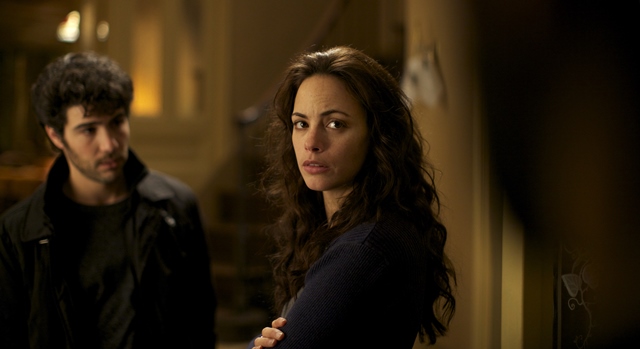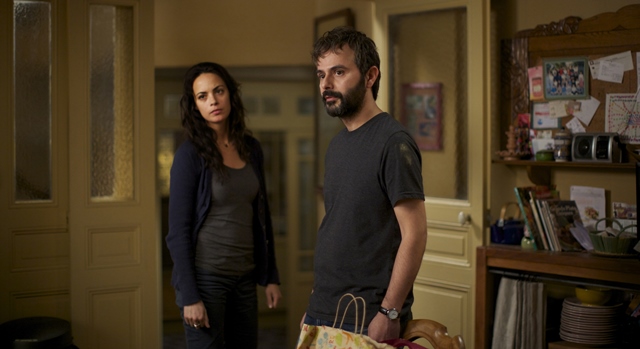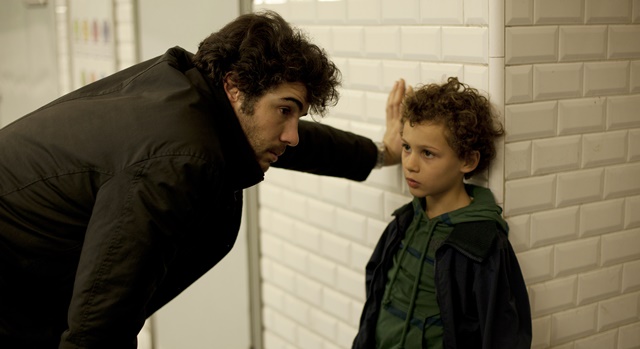CHICAGO – In anticipation of the scariest week of the year, HollywoodChicago.com launches its 2024 Movie Gifts series, which will suggest DVDs and collections for holiday giving.
Asghar Farhadi’s ‘The Past’ Finds Resonance Through Subtlety of Human Interaction
 Rating: 4.0/5.0 |
Filmgoers may bash the January to October movie fare for being boisterous, obnoxious, directed by Michael Bay, etc. However, even during the supposedly tasteful sanctuary that is the award season of November to January, those films themselves can be lumped together to sponsor their own lack of subtlety. That is not to say these films aren’t as good as they are, but only that after seeing numerous movies which could be weaseled into sarcastic “Tropic Thunder” previews (looking at you, “Saving Mr. Banks”), the yearly accusation of certain films “trying too hard” to become “Oscar bait” proves to be a “Transformers”-like inundation in itself.
In the second big weekend of 2014 arrives “The Past,” a leftover from last year but one just opening on Friday in Chicago. For those who are looking for something that doesn’t try too hard, but with an even bigger pay-off on a more humbled scale, “The Past” should be necessary medication. And though it would be great in the context of any time of the film year, it is a movie with a strong deliberate sense from its storyteller, “A Separation” writer/director Asghar Farhadi, who has control of his characters and the course he sets them on, but absolutely most importantly, that of himself. For one, there is no gratuitous dramatic explosion of questionable sincerity to be witnessed in this movie, and yet two days later, a shot of two hands in “The Past” hasn’t left my mental list of trending topics.

The Past
Photo credit: Sony Pictures Classics
While its title is probably its most blunt force, “The Past” begins by presenting human beings in what seems to be a very mundane setting, with the pacing of a careful city drive segmented by numerous traffic stop meditations. Ahmad (Ali Mosaffa) travels from Iran to France to meet up with his ex-wife Marie (Berenice Bejo). Marie has two daughters, the young Lea (Jeanne Jestin) and high-schooler Lucie (Pauline Burlet), who are not Ahmad’s biological children.
Though it has been four years since their separation, Marie needs Ahmad’s signature to finalize their divorce, so that she may get married to her current boyfriend Samir (Tahar Rassim). Along with her two daughters, Marie lives with Samir and his son Fouad (Elyes Aguis), a child from the wife of Samir’s current marriage, Celine. With Celine’s depression having driven Samir away, she now lays alone in a hospital bed, comatose after a disturbing public act.
With maybe the first hour giving a home to these characters, the relationships they have with each other are shown through non-cinematic domestic events (Marie having to scold Fouad for spilling paint in her house, Ahmad and Marie trying to find Lucie who never comes home after school). “The Past” then transitions to a mystery thriller of the lowest key. With its title context, the film then begins to show more clearly these various knots of misunderstandings created by characters to protect themselves from others. These moments are the movie’s ultimate charm, and one that makes it more resonant than one could imagine. It is incredible to feel tension with just the gradual revelation of lies and truths.

The Past
Photo credit: Sony Pictures Classics
The film is made up of a small list of talking parts, with actors who do not call attention to themselves. Bejo even played Marie’s opposite in her last famous role, that of movie star Peppy Miller in “The Artist,” and here resumes compelling normalcy as an ex-wife and girlfriend stuck between men who might be duplicates.
Farhadi directs his players to be strong and tempered, keeping sharpness even in their moments of potentially showier confrontation (like when Marie physically responds to Lucie’s acts). Two of the three children are especially notable, relentless at times in their energy but believable to their appropriate ages. The tireless physical rebellion of Aguis’ Fouad as he struggles to get away from adults trying to lock him in a room; the tearfulness of Burlet’s teen Lucie, who finally externalizes her fear of a situation that she can no longer hide from.
With its subtlety working to a calming advantage (and one worth sticking through during its most gradual moments), “The Past” is a movie made up of graceful small touches. For one, the film’s aforementioned segmented moments involve the usage of shots in which characters cannot be heard on the other side of clear glass. It happens numerous times, sometimes from a character’s point of view, or with the viewer stuck in a candid static shot, watching two characters talk. For however one may want to explain these visuals, these moments give the viewer a time to breathe, especially as the film gears up for its stressful scenes.

The Past
Photo credit: Sony Pictures Classics
Perhaps its most significant small touch is that which involves the precise art of crafting authentic conversation, not just the construction of individual sentences. It’s a subtle art form that one can easily take for granted. Spoken from characters who are planted in a very average, non-threatening existence, Farhadi creates very strong interactions between characters that are perfectly fine-tuned to progress the story with its believable people. Their thoughts are not expressed in winding monologues, or even in interactions that are sharp in screenwriting, but not sharp enough for average human beings (especially those who don’t write scripts). Even the general sentence length spoken in “The Past” is just right.
Not only does this very specific, slightly nerdy charm work for the characters, but for the movie’s twisting nature. Though without a conventionally disturbing image, or one without a climactic shouting match battle royale, “The Past” slowly unweaves its tale of lie games with characters who are only clever in the way they lie. Its twists are most believable as they are borne from an accumulative pile of practical small lies, which the liars themselves often think are harmless. But such is where the cleverness of the film ends, in which Farhadi shows his own craftiness in being able to manage breathing characters within his wonderfully realized tale; one of subtle, yet devastating chain reactions.
 | By NICK ALLEN |


